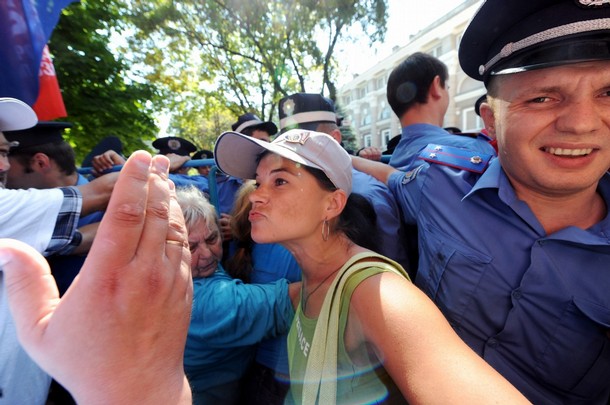
U.S.-led “Sea Breeze” Combined Exercise Canceled in Ukraine
Publication: Eurasia Daily Monitor Volume: 6 Issue: 120
By:

On June 22 Ukrainian Naval Headquarters confirmed unofficially that the country’s political deadlock has doomed the multinational military exercise Sea Breeze-2009. According to the Ukrainian headquarters sources, the U.S. Armed Forces European Command (EUCOM) and the U.S. Sixth Fleet notified Ukraine’s defense ministry on June 17 officially that foreign military units had to cancel their participation because the Ukrainian parliament failed to authorize the entry of such units on the national territory for Sea Breeze-2009 (UNIAN, Ukrayinska Pravda, June 22).
This exercise has been held annually since 1997 (except 2006) on Ukraine’s Black Sea coast and at sea as well as at the Shirokyi Lan base in Mykolayiv oblast. Sea Breeze is a joint and combined naval, ground, and air exercise, U.S.-led and mainly U.S.-financed, lasting two weeks in July. It normally involves more than 2,000 military personnel from about fifteen NATO members and partner countries by invitation. The exercise is designed to enhance multinational interoperability -particularly with Ukrainian forces- by practicing operational information sharing, maritime interdiction, boarding and seizure of suspect ships, anti-submarine operations, mine countermeasures, diving missions, amphibious landings, urban warfare, improvised-explosive-device detection and disposal, paratroops’ landings, air warfare, and peacekeeping elements. Some of the combat training phases include live-fire practice. Naval, air, and ground force elements from the participant countries perform tasks together as part of Sea Breeze, using each other’s equipment in some cases.
Sea Breeze-2009 had been envisioned as the largest exercise ever in this series, according to Commander-in-Chief of the Ukrainian Navy Vice-Admiral Ihor Tenyukh. It was planned to include practice of anti-piracy operations as a major new element in this year’s Sea Breeze. The Ukrainian navy was looking forward to the anti-piracy phase of the exercise, preparatory to Ukrainian participation in NATO-led missions against Somali pirates (UNIAN, June 22).
Under Ukraine’s constitution and legislation, the entry of foreign military units on the national territory requires legislative approval in each case. Traditionally, the government prepares and the president submits annually to the Verkhovna Rada a list of international military exercises to be held in the given year in Ukraine, requesting parliamentary approval in the form of a special law. President Viktor Yushchenko duly submitted the draft law to enable the holding of Sea Breeze-2009 and other exercises on April 24. The Verkhovna Rada, however, stalled and ultimately declined to consider the draft law as late as June 12 (Interfax-Ukraine, June 12, 13). Five days later, with time running out for holding Sea Breeze in July, its cancellation became inevitable.
Sea Breeze was aborted also in 2006 for lack of parliamentary approval. In that year, Yushchenko failed to request parliamentary approval for the holding of Sea Breeze. The president apparently did not want this issue to spoil the political coalition he was negotiating with Party of Regions leader Viktor Yanukovych at that time, nominating Yanukovych as prime minister. Seemingly unsuspecting U.S. troops landed in the Crimea without the necessary parliamentary authorization, sparking vociferous protests by local Russian nationalist and leftist groups (with significant reinforcements from outside the Crimea). These exploited to the hilt the opportunity to pose as defenders of the Ukrainian constitution and laws. U.S. troops were blocked inside hostels by protesters while the U.S. military cargoes were sequestered on arrival by local port authorities. Local police in the Crimea and central authorities in Kyiv were powerless to change the situation. Then U.S. President George W. Bush was also forced to abort his scheduled visit to Ukraine at the same time. Russian television channels propagandized the protests, so as to encourage participation in them.
The center of gravity of Sea Breeze was moved to the Odessa region in 2007 and 2008 to avoid another outbreak of anti-NATO sentiment among Crimean Russians. The protests were manageable in these cases. Although originating in the overall framework of NATO’s Partnership for Peace program, Sea Breeze is not a NATO exercise. It is, rather, a joint Ukraine-U.S. exercise, to which other countries are invited to participate. Oblivious to such distinctions, local protesters and their handlers use the opportunity to demonize NATO.
The Verkhovna Rada’s failure to approve the entry of troops for this year’s exercise reflects a deepening crisis of institutions in Ukraine. The posts of defense minister (and one deputy minister), foreign affairs minister, finance minister, and other government posts are vacant due to infighting among political forces. Ukraine’s financial crisis threatens the funding of the country’s international military cooperation programs with a near-freeze. Inaction pending yet another round of elections is impairing Ukraine’s capacity at this time to advance however incrementally toward ultimate NATO membership.




